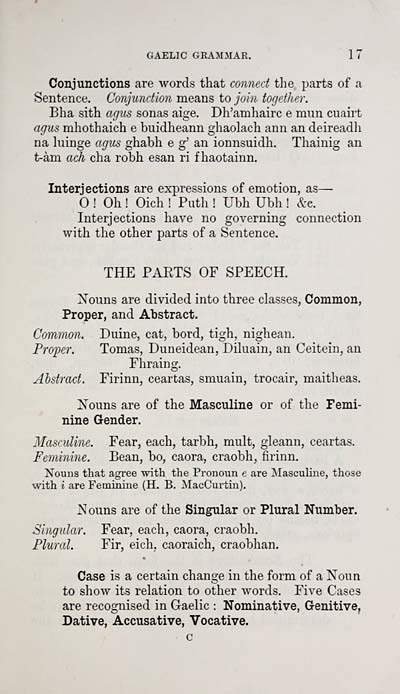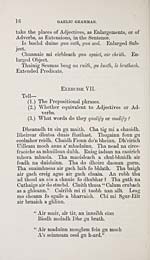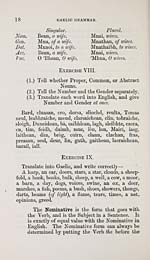Download files
Complete book:
Individual page:
Thumbnail gallery: Grid view | List view

GAELIC GRAMMAR, 17
Conjunctions are words that conned the parts of a
Sentence. Conjunction means to join together.
Bha sith agus sonas aige. Dh'amhairc e mun cuairt
agus mhothaich e buidheann ghaolach ann an deireadh
na luinge agm ghabh e g' an ionnsuidh. Thainig an
t-am ach cha robh esan ri f haotainn.
Interjections are expressions of emotion, as —
! Oh ! Oich ! Puth ! Ubh Ubh ! &e.
Interjections have no governing connection
with the other parts of a Sentence.
THE PARTS OF SPEECH.
Xouns are divided into three classes, Common,
Proper, and Abstract.
Common. Duine, cat, bord, tigh, nighean.
Proper. Tomas, Duneidean, Dikiain, an Ceitein, an
Fhraing.
Abstract. Firinn, ceartas, smuain, trocair, maitheas.
Xouns are of the Masculine or of the Femi-
nine Gender.
Masculine. Fear, each, tarbh, mult, gleann, ceartas.
Feminine. Bean, bo, caora, craobh, firinn.
Nouns that agree with the Pronoun e are Masculine, those
with i are Feminine (H. B. MacCurtin).
Nouns are of the Singular or Plural Number.
Singular. Fear, each, caora, craobh.
Plural. Fir, eich, caoraich, craobhan.
Case is a certain change in the form of a Noun
to show its relation to other words. Five Cases
are recognised in Gaelic : Nominative, Genitive,
Dative, Accusative, Vocative,
c
Conjunctions are words that conned the parts of a
Sentence. Conjunction means to join together.
Bha sith agus sonas aige. Dh'amhairc e mun cuairt
agus mhothaich e buidheann ghaolach ann an deireadh
na luinge agm ghabh e g' an ionnsuidh. Thainig an
t-am ach cha robh esan ri f haotainn.
Interjections are expressions of emotion, as —
! Oh ! Oich ! Puth ! Ubh Ubh ! &e.
Interjections have no governing connection
with the other parts of a Sentence.
THE PARTS OF SPEECH.
Xouns are divided into three classes, Common,
Proper, and Abstract.
Common. Duine, cat, bord, tigh, nighean.
Proper. Tomas, Duneidean, Dikiain, an Ceitein, an
Fhraing.
Abstract. Firinn, ceartas, smuain, trocair, maitheas.
Xouns are of the Masculine or of the Femi-
nine Gender.
Masculine. Fear, each, tarbh, mult, gleann, ceartas.
Feminine. Bean, bo, caora, craobh, firinn.
Nouns that agree with the Pronoun e are Masculine, those
with i are Feminine (H. B. MacCurtin).
Nouns are of the Singular or Plural Number.
Singular. Fear, each, caora, craobh.
Plural. Fir, eich, caoraich, craobhan.
Case is a certain change in the form of a Noun
to show its relation to other words. Five Cases
are recognised in Gaelic : Nominative, Genitive,
Dative, Accusative, Vocative,
c
Set display mode to: Large image | Transcription
Images and transcriptions on this page, including medium image downloads, may be used under the Creative Commons Attribution 4.0 International Licence unless otherwise stated. ![]()
| Early Gaelic Book Collections > Blair Collection > Gaelic texts for schools > (19) |
|---|
| Permanent URL | https://digital.nls.uk/79350611 |
|---|
| Description | A selection of books from a collection of more than 500 titles, mostly on religious and literary topics. Also includes some material dealing with other Celtic languages and societies. Collection created towards the end of the 19th century by Lady Evelyn Stewart Murray. |
|---|
| Description | Selected items from five 'Special and Named Printed Collections'. Includes books in Gaelic and other Celtic languages, works about the Gaels, their languages, literature, culture and history. |
|---|

